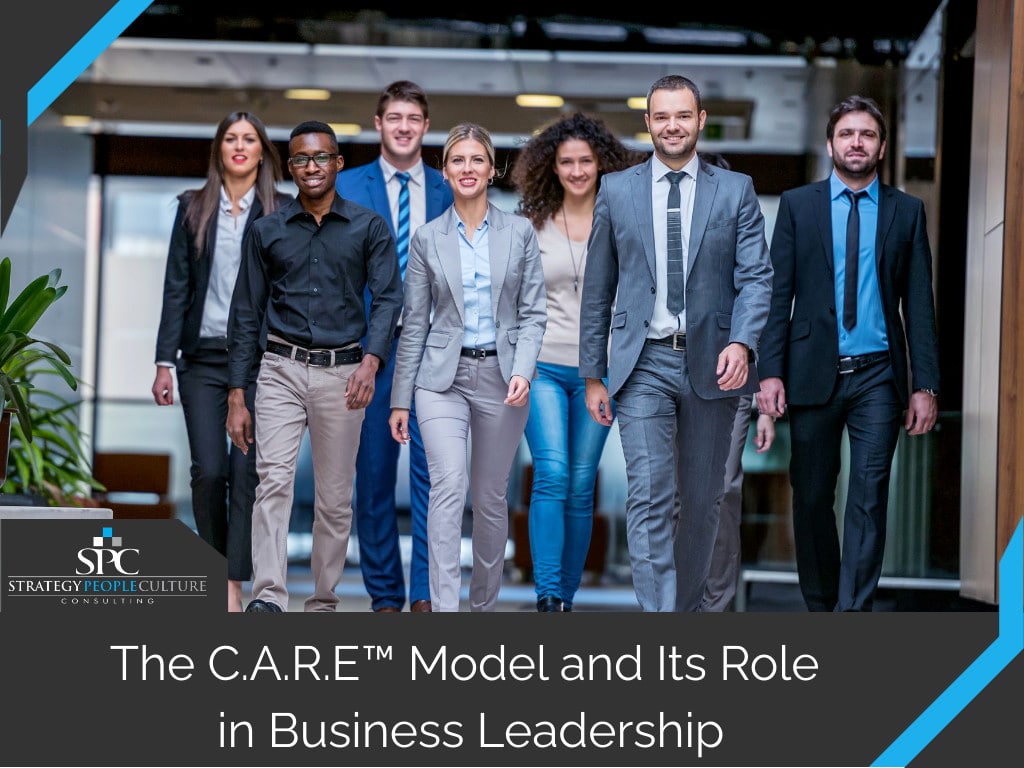The C.A.R.E™ Model and Its Role in Business Leadership

There are dozens (if not hundreds) of assessment methods when it comes to company culture and leadership. Every famous CEO or business guru has a different tactic, and sifting through them to find the right model can be overwhelming.
That’s why we came up with our proprietary C.A.R.E.™ model.
This is a tried-and-true way to evaluate organizational culture and leadership. We use it to score our clients in assessments, but it’s also the foundation we recommend leaders use within their organizations.
Let’s take a look at this model’s elements and effectiveness. We’ll also give you some tips on using it to assess your own business and leadership styles.
What is C.A.R.E.™?
Our team at Strategy People Culture has identified top key characteristics that contribute to a successful, well-led organization. These are:
- Conviction
- Adaptability/Accountability
- Realness
- Enthusiasm
Analyzing the presence of these characteristics (or lack thereof) in your business is a surefire way to understand where your company leadership stands. The C.A.R.E.™ model helps you learn your weaknesses, then move toward improved strategies within the organization.
To use our model within your company, you’ll need to understand each characteristic’s importance fully. So here’s a more in-depth look at each of the crucial elements.
1. Conviction
Our first characteristic revolves around the ability to make difficult decisions with confidence and intelligence.
In today’s confusing, chaotic times, we need leaders with conviction. People are worried about everything from the economy to their personal health, and a leader’s ability (or inability) to face these concerns with confidence can make or break a company.
Just recently, The Growth Faculty put it wonderfully: “To be a good leader, you need to understand that you bring the weather.”
In other words, your confidence establishes how others feel about the company’s future and upcoming problems. A leader’s conviction can have massive waves on the company’s overall culture and success.
Rather than worrying about what makes them seem “agreeable” or “nice,” leaders need to consider what makes them seem confident and competent. Their conviction in decisions will speak more about their values than any nicety ever will.
At Strategy People Culture, we continuously assess our partners’ abilities to challenge normative trends, make hard decisions, and lead others with conviction. We encourage you to do the same, especially when so many CEOs and political leaders strike the public as fickle and untrustworthy.
2. Adaptability & Accountability
As an article on Leadership Now stated, “Uncertainty is now a workplace norm, and quickly managing new circumstances is a must-have survival and success capability.”
That’s where our next set of characteristics comes into play.
Adaptability and accountability go hand-in-hand. So when pandemics strike, the economy takes a turn, or other you-know-what hits the fan, employees need to know they’re being guided by flexible, ever-evolving leadership.
More importantly, they need leaders that will be accountable for the tough decisions they make. Up to 84% of employees have reported that how their leaders behave is the single most important factor influencing accountability throughout their organization.
We encourage all of our partners to look at their ability to adapt to changes, then remain accountable for those nimble adaptations. This allows for the formation of trust and strength within a business.
Without adaptability, accountability, or trust, rigid businesses in today’s world face:
- More company stress
- Less employee energy
- Lower levels of productivity
- More used sick days
- Less engagement
- More employee burnout
Take a look at your leadership style and company culture. Is it one that embraces change in a trustworthy, cooperative manner? Or is it one that bends and breaks under sudden societal shifts or problems?
3. Realness
Next, let’s talk about authenticity: something more and more employees care about in their workplaces.
We live in an era of filters, of air-brushing and viewing our own lives through rose-colored glasses. As much as we might want to sugarcoat the difficulties and complexities of the modern workplace, that’s not the best route to take.
In fact, most employees don’t want to work for a company that sweeps the truth under the rug.
The 2021 Edelman Trust Barometer revealed “an epidemic of misinformation and widespread mistrust of societal institutions and leaders” has swept the world – and it’s a major concern for many workers and leaders.
“Realness” is a critical characteristic in any successful leadership team and something every organization should weave into its fabric. C-suite members and managers should be placing a huge emphasis on halting the spread of misinformation, building trust, and communicating with clarity and honesty.
As you use this model to assess your own business and leadership style, ask yourself about your realness in front of others. Are you embracing genuine methods of communication – or are you applying a filter to yourself and your statements?
We don’t claim to know everything, but we do know one thing: modern workers won’t stand for disingenuous leaders or company falsehoods. Is your organization a part of the misinformation plague, or one that is open and honest?
4. Enthusiasm
Last in our C.A.R.E.™ model is enthusiasm. Keep in mind this isn’t just “passion,” which can be warped and twisted into a characteristic that takes away from a company’s positive attitude.
Enthusiasm is a powerful, contagious element that drives business forward with excitement.
As a leader, your attitude toward big goals and day-to-day work sets the tone for the rest of the organization. If you’re not enthusiastic about what you’re doing, others around you likely won’t be, either.
In recent reports, only about 55% of employees reported feeling completely plugged in at work, and roughly 66% “have passion and excitement” about their work. So if you want more than half of your workplace to feel inspired and enthusiastic, you’ll need to set that example for them.
This isn’t to say you won’t face highs and lows, but an enthusiastic approach to both will reap more rewards than a disinterested or negative attitude. At Strategy People Culture, we firmly believe enthusiasm is a behavior that can be taught, both to leaders and companies as a whole.
During your company assessment, take a long look at your attitude, as well as that of C-suite members and other leaders. Is it one that embodies excitement and positivity? If not, what can you do to increase your score in that department?
Now, How Does All of This Apply to Business?
Our C.A.R.E.™ model isn’t just about improving company culture and leadership styles – it’s about strengthening your business and helping it reach new levels of success.
Strong scores in these characteristic categories indicate a better company culture, which then translates into increased profits. For example, executives who say their culture is “extremely healthy” are 1.5 times more likely to report average revenue growth of more than 15% over three years, according to a well-known Oxford and Grant Thornton study.
Furthermore, assessing the characteristics in the C.A.R.E.™ model can help you work toward:
- Better employee retention
- More successful referrals
- Stronger recruitment tactics
- Improve employee performances
Want to potentially rank in a competition like “Best Places to Work” in America? Strategy People Culture’s CEO led an organizational change to achieve this successfully. Evaluating the C.A.R.E.™ elements is an extremely effective way to compete. Other businesses are already scoring high – and learning your score can only help.
This model isn’t just about learning your leadership’s strengths and weaknesses. Instead, with the C.A.R.E.™ model, you can find ways to build a stronger foundation for better results in all aspects of your organization.
Learn Your C.A.R.E.™ Score Today
Strategy People Culture functions on a core belief that all businesses are built on people. If you want to improve a company’s public image and revenue opportunities, you need to start with a strong culture and effective leadership.
Are you interested in learning more about our proprietary C.A.R.E.™ model? Reach out today.
We’re more than happy to schedule a free consultation with your leadership team. Let’s see how you score with these characteristics and what we can do to improve your company culture.





